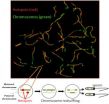(Press-News.org) You win some, you lose some. You get the perfect job—the one your heart is set on. Or you get snubbed. You win the girl (or guy) of your dreams—or you strike out. Such are life's ups and downs.
But what if you win and lose at the same time? You land a good job—but not a great one. Or you do get a plum offer—but not the one you wanted?
A study published in an upcoming issue of Psychological Science, a journal of the Association for Psychological Science, says you'll find a way to be happy anyway.
"Good outcomes have relative value and absolute value, and that affects our happiness," explains Carnegie Mellon assistant professor Karim S. Kassam, who conducted the study with Carnegie colleague Carey K. Morewedge, Daniel T. Gilbert of Harvard University, and Timothy D. Wilson of the University of Virginia.
If you're a "winner"—you get the best, relative to the alternatives—you're happy regardless of the prize's absolute value.
"Losers"—who win something less valuable than the alternative—may at first be disappointed, but they usually come around. "People are motivated to think about things in the best possible light," says Kassam. So they move on to reflect on the absolute value, and find satisfaction there.
To test these phenomena, the authors ran two experiments. In the first, 297 people on the Boston streets were given lottery tickets. They were asked to scratch off one side and received cash in the amount printed underneath–$1, $3, $5, or $7. Then they scratched off the other side, revealing either a higher or lower amount. Afterwards, they completed questionnaires rating their happiness, disappointment, or regret.
The "winners" (who got the bigger of two amounts) were, unsurprisingly, happier than the losers—but also equally happy with any prize. The losers' happiness, by contrast, increased with the prize amounts.
How does this work? A second experiment tested the hypothesis that the losers think harder to find happiness. The researchers distracted the participants brains while asking them to consider differing rewards.
In four trials, 31 participants were asked to memorize either a two- or an eight-digit number and choose one of two boxes with prize amounts ($3 or $5) inside, which were displayed on a screen. At the end, they were told, they'd receive the amount in one of their chosen boxes, randomly selected. Then both boxes opened. Unknown to the participants, the design made them all losers—they'd always pick the lesser amount. The combinations of memory difficulty—"cognitive load"—and cash received ($3 or $5) varied. In each trial, participants rated their feelings.
Again, larger prizes made these losers happier—but only when they had enough brainpower to think about it. Under higher cognitive load, they were glad to get either amount.
"When you win something, it's always a positive experience," says Kassam. "But if there's this tinge of negative affect, that motivates people to rationalize, to reframe things in a way that will make them happy." The good news: even if you can't do that extra thinking, you'll settle—for happiness.
### END
Happiness, comparatively speaking: How we think about life's rewards
2011-04-06
ELSE PRESS RELEASES FROM THIS DATE:
George Mason students highlight dangers of distracted driving
2011-04-06
The HFES George Mason University (GMU) Student Chapter was recently featured in a television news story about an interactive driving simulation video game the students developed to highlight the human factors/ergonomics science behind distracted driving. The demonstration made its first appearance at the October 2010 USA Science and Engineering Festival in Washington, DC, where the GMU students partnered with the Federation of Associations in Behavioral & Brain Sciences (FABBS). Nearly half a million visitors attended the two-day festival, and the distracted driving display ...
tokyo rag Launches Inaugural Boutique Collection of Handmade Luxury Fashion Accessories
2011-04-06
tokyo rag, a handcrafter of high end fashion accessories, unveils a new 'Tokyo-inspired' collection for this summer. Covering a wide product range in distinctive and vibrant designs, tokyo rag targets women and men with rock star attitude, who are fresh in mind, never tired to explore and interested in couture and style. No snobbishness, just high quality accessories with a creative twist. Each piece is handcrafted using luxury fabrics and ecological tanned top quality leathers from carefully selected European tanneries.
The fashion accessories are available in four ...
MU researcher says instructors can reduce cheating by being clear
2011-04-06
A new University of Missouri study says that the reasons students give for cheating are rational, and that stricter punishments won't solve the problem. Instead, teachers should communicate clear standards and provide consistent enforcement to reduce instances of cheating.
Edward Brent, associate chair of the Department of Sociology in the MU College of Arts and Science, and Curtis Atkisson, an MU anthropology student, asked students, "What circumstances, if any, could make cheating justified?"
While a majority of the students said that no circumstances can ever justify ...
Elevated levels of sodium blunt response to stress, study shows
2011-04-06
CINCINNATI—All those salty snacks available at the local tavern might be doing more than increasing your thirst: They could also play a role in suppressing social anxiety.
New research from the University of Cincinnati (UC) shows that elevated levels of sodium blunt the body's natural responses to stress by inhibiting stress hormones that would otherwise be activated in stressful situations. These hormones are located along the hypothalamic-pituitary-adrenal (HPA) axis, which controls reactions to stress.
The research is reported in the April 6, 2011, issue of The Journal ...
NIH, USU study maps hotspots of genetic rearrangement
2011-04-06
Researchers have zoomed in on mouse chromosomes to map hotspots of genetic recombination — sites where DNA breaks and reforms to shuffle genes. The findings of the scientists at the National Institutes of Health and Uniformed Services University of Health Sciences (USU) have the potential to improve the detection of genes linked to disease and to help understand the root causes of genetic abnormalities. The research, published online April 3 in Nature, moves scientists one step closer to understanding how mammals evolve and respond to their environments.
In this image, ...
Analysis of opioid prescription practices finds areas of concern
2011-04-06
An analysis of national prescribing patterns shows that more than half of patients who received an opioid prescription in 2009 had filled another opioid prescription within the previous 30 days. This report also suggested potential opportunities for intervention aimed at reducing abuse of prescription opioids.
Researchers from the National Institute on Drug Abuse (NIDA), a component of the National Institutes of Health, will publish results of this analysis in this week's Journal of the American Medical Association (JAMA).
"More research is needed to see if current ...
Frozen comet had a watery past, University of Arizona scientists find
2011-04-06
For the first time, scientists have found convincing evidence for the presence of liquid water in a comet, shattering the current paradigm that comets never get warm enough to melt the ice that makes up the bulk of their material.
"Current thinking suggests that it is impossible to form liquid water inside of a comet," said Dante Lauretta, an associate professor of cosmochemistry and planet formation at the UA's Lunar and Planetary Laboratory. Lauretta is the principal investigator of the UA team involved in analysis of samples returned by NASA's Stardust mission.
UA ...
Using MRI, researchers may predict which adults will develop Alzheimer's
2011-04-06
OAK BROOK, Ill. – Using MRI, researchers may be able to predict which adults with mild cognitive impairment are more likely to progress to Alzheimer's disease, according to the results of a study published online and in the June issue of Radiology.
Mild cognitive impairment (MCI) is an intermediate stage between the decline in mental abilities that occurs in normal aging and the more pronounced deterioration associated with dementia, a group of brain disorders that includes Alzheimer's disease (AD).
Individuals with MCI develop AD at a rate of 15 to 20 percent per ...
Marbella University Unveils an MBA Program to "Save Humanity and the Planet"
2011-04-06
Lies, cheat, deceit, distortion, hype, and a blind pursuit of profit have poisoned the business world. The price of this has been the destruction of the planet, its ecosystems and the alienation of humans from their soul and genuine inner needs.
Pollution, contamination, climate change, poverty, rising sea level, unemployment, financial crisis, social unrest, war, and a general lack of trust has taken over as a result.
The world needs new managers and CEOs; new MBAs
The state of humanity and the planet clearly shows: politics has failed, corporations have failed, ...
Study: Socioeconomics playing reduced role in autism diagnoses
2011-04-06
WASHINGTON, DC, April 4, 2011 — While there is an increasing equality in terms of the likelihood that children from communities and families across the socioeconomic spectrum will be diagnosed with autism, a new study finds that such factors still influence the chance of an autism diagnosis, though to a much lesser extent than they did at the height of rising prevalence.
"As knowledge has spread about autism, information is now more evenly distributed across different kinds of communities," said Peter S. Bearman, the Cole Professor of the Social Sciences at Columbia ...




